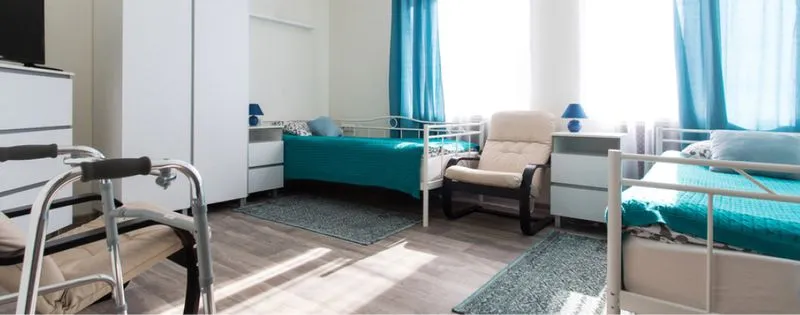Attorneys for Nursing Home Abuse
Our loved ones deserve to live their golden years with dignity and respect. Unfortunately, nursing home abuse is a problem more common than is often reported. If you suspect an elderly loved one is being neglected or abused in a Maryland care facility, you don’t have to face it alone.

Understanding the Signs of Nursing Home Neglect and Abuse
Nursing home abuse can take many forms, some of which may be difficult to spot unless you know the signs to look for. Here are some warning signs that might alert you to different types of harmful acts:
- Physical Abuse: Bruises, cuts, broken bones, unexplained injuries, excessive use of restraints
- Emotional Abuse: Yelling, humiliation, threats, intimidation, isolation, and withdrawal from social activities
- Sexual Abuse: Unexplained injuries or infections in the genital area, sexually suggestive behavior by staff or peers
- Neglect: Dehydration, malnutrition, bedsores, poor hygiene, medication errors, unsanitary living conditions
- Financial Abuse: Missing money or valuables, unauthorized charges on bank statements, sudden changes in wills or financial documents

When is a Nursing Home Liable for Elder Abuse?
Nursing homes have a legal duty to provide their residents with a safe and healthy living environment. This includes providing adequate medical care, supervision, hygiene assistance, and nutritious meals. When a facility fails to meet this duty and a resident suffers harm as a result, they can be held liable.
Some situations that can create liability for nursing home abuse or neglect include:
- Understaffing: A lack of qualified staff can lead to residents not receiving the care they need, increasing the risk of abuse and neglect.
- Improper Training: Staff who are not properly trained in nursing home care procedures and abuse prevention are more likely to cause harm.
- Ignoring Residents: Failing to respond to a resident’s call light, medication errors, or ignoring signs of abuse are all examples of negligence.
- Hiring Unqualified Staff: Background checks are essential to ensure staff members do not have a history of abuse or violence, and have the proper training, knowledge, and experience.
How to Report Nursing Home Abuse in Maryland
If you suspect your loved one is being abused or neglected in a nursing home, it is crucial to take action immediately. Here’s what you can do:
- Report the Abuse: Contact the Adult Protective Services office of your local Department of Social Services or the Long-Term Care Ombudsman Program through the Maryland Department of Aging.
- Document Everything: Keep detailed notes of any incidents you observe with dates, times, and witnesses. Take pictures of injuries or unsanitary conditions too.
- Seek Medical Attention: If your loved one has been injured, take them to a doctor or call 911.
- Contact an Attorney: An experienced nursing home abuse lawyer can advise you of your rights and help you navigate the legal process.

How Our Nursing Home Abuse Lawyers Help
At Burnett Injury Group, our dedicated nursing home abuse attorneys understand the emotional toll that nursing home abuse can take on families. We want to help you achieve justice and hold the facility accountable.
Here’s how we can assist you:
- Investigating the Abuse: We will gather evidence, interview witnesses, and work with medical experts to build a strong case.
- Standing up to Insurance Companies & Their Attorneys: We will negotiate aggressively with the nursing home’s representatives to get your family the compensation you deserve.
- Filing a Lawsuit: If necessary, we will file a lawsuit to recover damages for your loved one’s medical bills, pain and suffering, and emotional distress.
Speaking Up for Your Elderly Loved Ones
If you suspect your loved one is being abused or neglected in a Maryland nursing home, contact Burnett Injury Group today at (443) 214-2600 or by completing our online contact form here for a free consultation. We will fight to protect your loved one’s rights and hold those responsible accountable.
Have a Referral?
Speak with our experienced personal injury team to explore your options.

Practice Areas
If you or a loved one was injured, talk with our team today to learn more about how we can help you get the justice you deserve.
FAQs for Nursing Home Abuse Lawsuits
Find answers to common questions about injury law and the legal process.
Possible damages that you may recover if your loved one suffered nursing home abuse or neglect include:
- economic damages – the cost of past and future medical care resulting from the abuse.
- non-economic damages – the pain and suffering your love one endured as a result of the abuse, and if your loved one died from the abuse, the pain and suffering endured by the wrongful death beneficiaries
The damages recoverable will be dependent on the circumstances of your case. An experienced personal injury attorney can help you assess the full extent of your potential recovery.
The statute of limitations for a nursing home abuse case in Maryland is generally three years. It’s important to note that there may be exceptions to this general rule, and the specific details of your elder abuse case could impact the lawsuit’s deadlines.
If your loved one is hesitant to open up about the abuse or neglect they have experienced, try to be patient and understanding of their situation while ensuring them that you believe them and want to help.
Even though they might not want to discuss it at this point, you can still try to document signs of abuse or neglect that you notice. You might also want to consider reaching out to a therapist, social worker, or advocate for the elderly who can provide guidance and support. Our attorneys are familiar with these types of situations and can help you navigate towards possible resolutions.

